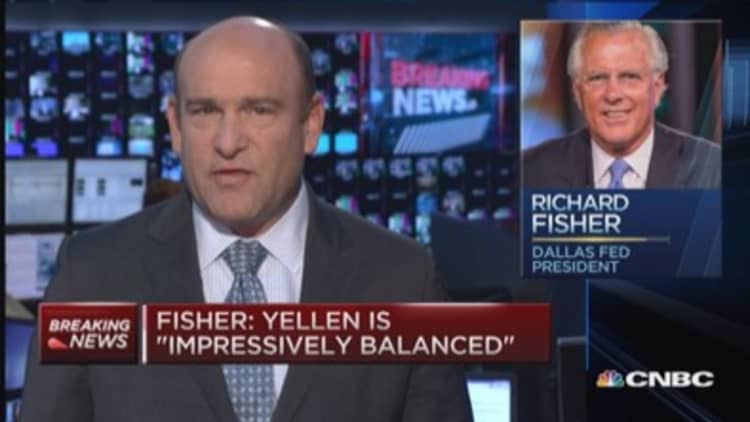
Dallas Federal Reserve Richard Fisher said he voted in favor of the October Open Market Committee statement in part because of a more hawkish tilt in the sentiment, according to prepared remarks for a speech he is delivering Monday afternoon.
However, he said the third leg of the Fed's monthly bond-buying program never should have happened and ended up posing economic risks that weren't worth the benefits.
Speaking a week after the U.S. central bank ended its quantitative easing policy, Fisher described Chair Janet Yellen as "impressively balanced." The FOMC voted, with just one dissent, to halt the monthly-bond buying program, which had taken the Fed's balance sheet past the $4.5 trillion mark.
Fisher is a reliably hawkish member, but said he felt the language from the most recent statement reflected a tone that was in favor of hiking rates more quickly than had been indicated previously. Specifically, he cited the "considerable time" language in the statement that refers to how long it will take from the end of QE until the first rate hike since short-term rates were taken down to near-zero in late 2008.
Read MoreR.I.P. QE: Fed shuts off the printing presses
He said that language had been effectively "neutered by other more hawkish statements.
Yellen, he said, has proven to be "neither dove nor hawk" in her first year at the helm.
At the same time, Fisher warned of "a lot of inflationary tinder," remarks that echoed a recent statement from former Chairman Alan Greenspan, who said the Fed was sitting on "a pile of tinder."
Read MoreWait till you see what Alan Greenspan's been saying
In a speech titled, "R.I.P. QE3 ... Or Will It?" said the third leg of the program had clearly seen effectiveness that "waned" while "current and potential future costs were mounting. I was thus an enthusiastic supporter of killing the program."
"Indeed, I would rather we had never had QE3 in the first place. To this day, I feel that the costs of accumulating another $1.7 trillion of Treasuries and (mortgage-backed securities) will be shown to exceed the benefits," he added.
Fisher also suggested that the surge in stock prices since QE began in 2009 might subside now that the program is over.
"Only time will tell if stocks have risen to unsustainable heights and, if so, how deep a correction might be needed to bring them back to sustainable valuations," he said.
—CNBC's Steve Liesman contributed to this report.


